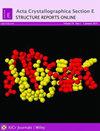2-(2,4-二氯苯基)-4-羟基-9-苯基磺基- 9h -咔唑-3-乙醛的晶体结构。
IF 0.9
Acta crystallographica. Section E, Structure reports online
Pub Date : 2014-11-08
eCollection Date: 2014-12-01
DOI:10.1107/S1600536814024064
引用次数: 1
摘要
在标题化合物C25H15Cl2NO4S中,二氯苯基环与咔唑环体系的平均平面旋转了68.69(11)°[r.m.s]。偏差= 0.084(2)°]。羟基参与分子内O- h⋯O氢键,产生S(6)图集基序。在晶体中,一对对C-H⋯Cl氢键将分子连接成具有R(2) 2(26)基序的倒置二聚体。弱的C-H⋯O相互作用进一步将这些二聚体连接成在[100]中传播的条带。本文章由计算机程序翻译,如有差异,请以英文原文为准。



Crystal structure of 2-(2,4-di-chloro-phen-yl)-4-hydroxy-9-phenyl-sulfonyl-9H-carbazole-3-carbaldehyde.
In the title compound, C25H15Cl2NO4S, the di-chloro-phenyl ring is twisted by 68.69 (11)° from the mean plane of the carbazole ring system [r.m.s. deviation = 0.084 (2)°]. The hy-droxy group is involved in an intra-molecular O-H⋯O hydrogen bond, which generates an S(6) graph-set motif. In the crystal, pairs of C-H⋯Cl hydrogen bonds link mol-ecules into inversion dimers with an R (2) 2(26) motif. Weak C-H⋯O inter-actions further link these dimers into ribbons propagating in [100].
求助全文
通过发布文献求助,成功后即可免费获取论文全文。
去求助
来源期刊
自引率
33.30%
发文量
0
审稿时长
1.3 months
期刊介绍:
Acta Crystallographica Section E: Structure Reports Online is the IUCr highly popular open-access structural journal. It provides a simple and easily accessible publication mechanism for the growing number of inorganic, metal-organic and organic crystal structure determinations. The electronic submission, validation, refereeing and publication facilities of the journal ensure very rapid and high-quality publication, whilst key indicators and validation reports provide measures of structural reliability. In 2009, the journal published over 4000 structures. The average publication time is less than one month.

 求助内容:
求助内容: 应助结果提醒方式:
应助结果提醒方式:


